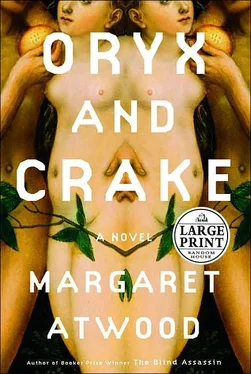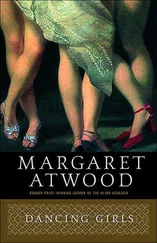Jack had a name for the building where the movies went on. He called it Pixieland. None of the children knew what that meant— Pixieland —because it was an English word and an English idea, and Jack couldn’t explain it. “All right, pixies, rise and shine,” he’d say. “Candy time!” He brought candies for them as a treat, sometimes. “Want a candy, candy?” he’d say. That also was a joke, but they didn’t know what it meant either.
He let them see the movies of themselves if he felt like it, or if he’d just been doing drugs. They could tell when he’d been shooting or snorting, because he was happier then. He liked to play pop music while they were working, something with a bounce. Upbeat, he called it. Elvis Presley, things like that. He said he liked the golden oldies, from back when songs had words. “Call me sentimental,” he said, causing puzzlement. He liked Frank Sinatra too, and Doris Day: Oryx knew all the words to “Love Me or Leave Me” before she had any idea what they meant. “Sing us some pixieland jazz,” Jack would say, and so that was what Oryx would sing. He was always pleased.
“What was this guy’s name?” said Jimmy. What a jerk, this Jack. Jack the jerk, the jerkoff. Name-calling helped, thought Jimmy. He’d like to twist the guy’s head off.
“His name was Jack. I told you. He told us a poem about it, in English. Jack be nimble, Jack be quick, Jack has got a big candlestick. ”
“I mean his other name.”
“He didn’t have another name.”
Working was what Jack called what they did. Working girls , he called them. He used to say, Whistle while you work . He used to say, Work harder . He used to say, Put some jazz into it . He used to say, Act like you mean it, or you want to get hurt? He used to say, Come on, sex midgets, you can do better . He used to say, You’re only young once .
“That’s all,” said Oryx.
“What do you mean, that’s all?”
“That’s all there was,” she said. “That’s all there was to it.”
“What about, did they ever…”
“Did they ever what?”
“They didn’t. Not when you were that young. They couldn’t have.”
“Please, Jimmy, tell me what you are asking.” Oh, very cool. He wanted to shake her.
“Did they rape you?” He could barely squeeze it out. What answer was he expecting, what did he want?
“Why do you want to talk about ugly things?” she said. Her voice was silvery, like a music box. She waved one hand in the air to dry the nails. “We should think only beautiful things, as much as we can. There is so much beautiful in the world if you look around. You are looking only at the dirt under your feet, Jimmy. It’s not good for you.”
She would never tell him. Why did this drive him so crazy? “It wasn’t real sex, was it?” he asked. “In the movies. It was only acting. Wasn’t it?”
“But Jimmy, you should know. All sex is real.”
Snowman opens his eyes, shuts them, opens them, keeps them open. He’s had a terrible night. He doesn’t know which is worse, a past he can’t regain or a present that will destroy him if he looks at it too clearly. Then there’s the future. Sheer vertigo.
The sun is above the horizon, lifting steadily as if on a pulley; flattish clouds, pink and purple on top and golden underneath, stand still in the sky around it. The waves are waving, up down up down. The thought of them makes him queasy. He’s violently thirsty, and he has a headache and a hollow cottony space between his ears. It takes him some moments to register the fact that he has a hangover.
“It’s your own fault,” he tells himself. He behaved foolishly the night before: he guzzled, he yelled, he gibbered, he indulged in pointless repinings. Once he wouldn’t have had a hangover after so little booze, but he’s out of practice now, and out of shape.
At least he didn’t fall out of the tree. “Tomorrow is another day,” he declaims to the pink and purple clouds. But if tomorrow is another day, what’s today? The same day as it always is, except that he feels as if he has tongue fur all over his body.
A long scrawl of birds unwinds from the empty towers—gulls, egrets, herons, heading off to fish along the shore. A mile or so to the south, a salt marsh is forming on a one-time landfill dotted with semi-flooded townhouses. That’s where all the birds are going: minnow city. He watches them with resentment: everything is fine with them, not a care in the world. Eat, fuck, poop, screech, that’s all they do. In a former life he might have snuck up on them, studied them through binoculars, wondering at their grace. No, he never would have done that, it hadn’t been his style. Some grade-school teacher, a nature snoop—Sally Whatshername?—herding them along on what she called field trips. The Compound golf course and lily ponds had been their hunting grounds. Look! See the nice ducks? Those are called mallards! Snowman had found birds tedious even then, but he wouldn’t have wished to harm them. Whereas right now he yearns for a big slingshot.
He climbs down from the tree, more carefully than usual: he’s still a bit dizzy. He checks his baseball cap, dumps out a butterfly—attracted by the salt, no doubt—and pisses on the grasshoppers, as usual. I have a daily routine, he thinks. Routines are good. His entire head is becoming one big stash of obsolete fridge magnets.
Then he opens up his cement-block cache, puts on his one-eyed sunglasses, drinks water from a stored beer bottle. If only he had a real beer, or an aspirin, or more Scotch.
“Hair of the dog,” he says to the beer bottle. He mustn’t drink too much water at a time, he’ll throw up. He pours the rest of the water over his head, gets himself a second bottle, and sits down with his back against the tree, waiting for his stomach to settle. He wishes he had something to read. To read, to view, to hear, to study, to compile. Rag ends of language are floating in his head: m ephitic, metronome, mastitis, metatarsal, maudlin.
“I used to be erudite,” he says out loud. Erudite . A hopeless word. What are all those things he once thought he knew, and where have they gone?
After a while he finds he’s hungry. What’s in the cache, foodwise? Shouldn’t there be a mango? No, that was yesterday. All that’s left of it is a sticky ant-covered plastic bag. There’s the chocolate energy Joltbar, but he doesn’t feel up to that, so he opens the can of Sveltana No-Meat Cocktail Sausages with his rusty can opener. He could use a better one of those. The sausages are a diet brand, beige and unpleasantly soft—babies’ turds, he thinks—but he manages to get them down. Sveltanas are always better if you don’t look.
They’re protein, but they’re not enough for him. Not enough calories. He drinks the warm, bland sausage juice, which—he tells himself—must surely be full of vitamins. Or minerals, at least. Or something. He used to know. What’s happening to his mind? He has a vision of the top of his neck, opening up into his head like a bathroom drain. Fragments of words are swirling down it, in a grey liquid he realizes is his dissolving brain.
Time to face reality. Crudely put, he’s slowly starving to death. A fish a week is all he can depend on, and the people take that literally: it can be a decent-sized fish or a very small one, all spikes and bones. He knows that if he doesn’t balance out the protein with starches and that other stuff—carbohydrates, or are those the same as starches?—he’ll start dissolving his own fat, what’s left of it, and after that his own muscles. The heart is a muscle. He pictures his heart, shrivelling up until it’s no bigger than a walnut.
Читать дальше












